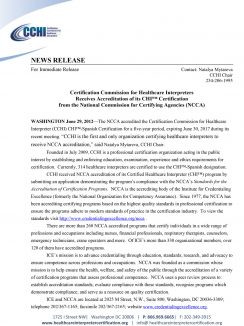WASHINGTON June 29, 2012—The NCCA accredited the Certification Commission for Healthcare Interpreter (CCHI) CHI™-Spanish Certification for a five-year period, expiring June 30, 2017 during its recent meeting. “CCHI is the first and only organization certifying healthcare interpreters to
receive NCCA accreditation,” said Natalya Mytareva, CCHI Chair.
Founded in July 2009, CCHI is a professional certification organization acting in the public
interest by establishing and enforcing education, examination, experience and ethics requirements for certification. Currently, 314 healthcare interpreters are certified to use the CHI™-Spanish designation.
CCHI received NCCA accreditation of its Certified Healthcare Interpreter (CHI™) program by submitting an application demonstrating the program’s compliance with the NCCA’s Standards for the Accreditation of Certification Programs. NCCA is the accrediting body of the Institute for Credentialing Excellence (formerly the National Organization for Competency Assurance). Since 1977, the NCCA has been accrediting certifying programs based on the highest quality standards in professional certification to ensure the programs adhere to modern standards of practice in the certification industry. To view the standards visit http://www.credentialingexcellence.org/ncca .
There are more than 260 NCCA accredited programs that certify individuals in a wide range of
professions and occupations including nurses, financial professionals, respiratory therapists, counselors, emergency technicians, crane operators and more. Of ICE’s more than 330 organizational members, over 120 of them have accredited programs.
ICE’s mission is to advance credentialing through education, standards, research, and advocacy to ensure competence across professions and occupations. NCCA was founded as a commission whose mission is to help ensure the health, welfare, and safety of the public through the accreditation of a variety of certification programs that assess professional competence. NCCA uses a peer review process to: establish accreditation standards; evaluate compliance with these standards; recognize programs which demonstrate compliance; and serve as a resource on quality certification.
